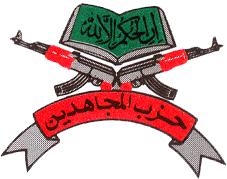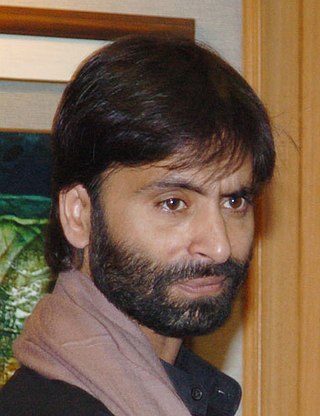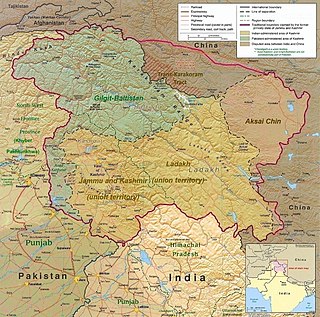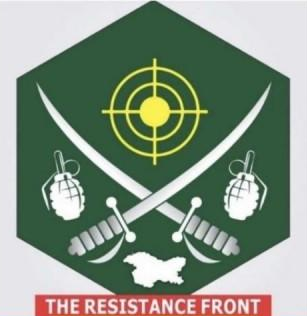
Lashkar-e-Taiba is a Pakistan-based militant Islamist Salafi jihadist organisation. Described as one of Pakistan's "most powerful jihadi groups", it is most infamous outside Pakistan. The organisation's primary stated objective is to merge the whole of Kashmir with Pakistan. It was founded in 1985–86 by Hafiz Saeed, Zafar Iqbal Shehbaz Abdullah Azzam and several other Islamist mujahideen with funding from Osama bin Laden during the Soviet–Afghan War. It has been designated a terrorist group by numerous countries.

Jaish-e-Mohammed is a Pakistan-based Deobandi Jihadist terrorist group active in Kashmir. The group's primary motive is to separate Kashmir from India and merge it into Pakistan.

Hizbul Mujahideen, also spelled Hizb-ul-Mujahideen, is a Pakistan-affiliated Islamist militant organisation that has been engaged in the Kashmir insurgency since 1989. It aims to separate Kashmir from India and merge it with Pakistan, and is thus one of the most important players in the region as it evolved the narrative of the Kashmir conflict by steering the struggle away from nationalism and towards jihadism.

The insurgency in Jammu and Kashmir, also known as the Kashmir insurgency, is an ongoing separatist militant insurgency against the Indian administration in Jammu and Kashmir, a territory constituting the southwestern portion of the larger geographical region of Kashmir, which has been the subject of a territorial dispute between India and Pakistan since 1947.

The Jammu Kashmir Liberation Front (JKLF) is a formerly armed, political separatist organisation active in both the Indian-administered and Pakistani-administered territories of Kashmir. It was founded by Amanullah Khan, with Maqbool Bhat also credited as a co-founder. Originally a militant wing of the Azad Kashmir Plebiscite Front, the organization officially changed its name to the Jammu Kashmir Liberation Front in Birmingham, England on 29 May 1977; from then until 1994 it was an active Kashmiri militant organization. The JKLF first established branches in several cities and towns of the United Kingdom and other countries in Europe, as well as in the United States and across the Middle East. In 1982, it established a branch in the Pakistani-administered territory of Azad Jammu and Kashmir, and by 1987, it had established a branch in the Indian-administered Kashmir Valley.

The Kashmir conflict is a territorial conflict over the Kashmir region, primarily between India and Pakistan, and also between China and India in the northeastern portion of the region. The conflict started after the partition of India in 1947 as both India and Pakistan claimed the entirety of the former princely state of Jammu and Kashmir. It is a dispute over the region that escalated into three wars between India and Pakistan and several other armed skirmishes. India controls approximately 55% of the land area of the region that includes Jammu, the Kashmir Valley, most of Ladakh, the Siachen Glacier, and 70% of its population; Pakistan controls approximately 30% of the land area that includes Azad Kashmir and Gilgit-Baltistan; and China controls the remaining 15% of the land area that includes the Aksai Chin region, the mostly uninhabited Trans-Karakoram Tract, and part of the Demchok sector.

Yasin Malik is a Kashmiri separatist leader and former militant who advocates the separation of Kashmir from both India and Pakistan. He is the Chairman of the Jammu Kashmir Liberation Front, which originally spearheaded armed militancy in the Kashmir Valley. Malik renounced violence in 1994 and adopted peaceful methods to come to a settlement of the Kashmir conflict. In May 2022, Malik pleaded guilty to charges of criminal conspiracy and waging war against the state, and was sentenced to life imprisonment.
Pakistan and state-sponsored terrorism refers to the involvement of Pakistan in terrorism through the backing of various designated terrorist organizations. Pakistan has been frequently accused by various countries, including its neighbours Afghanistan, Iran, and India, as well as by the United States, the United Kingdom, Germany, and France, of involvement in a variety of terrorist activities in both its local region of South Asia and beyond. Pakistan's northwestern tribal regions along the Afghanistan–Pakistan border have been described as an effective safe haven for terrorists by Western media and the United States Secretary of Defense, while India has accused Pakistan of perpetuating the insurgency in Jammu and Kashmir by providing financial support and armaments to militant groups, as well as by sending state-trained terrorists across the Line of Control and de jure India–Pakistan border to launch attacks in Indian-administered Kashmir and India proper, respectively. According to an analysis published by the Saban Center for Middle East Policy at the Brookings Institution in 2008, Pakistan was reportedly, "with the possible exception of Iran, perhaps the world's most active sponsor of terrorist groups... aiding these groups that pose a direct threat to the United States. Pakistan's active participation has caused thousands of deaths in the region; all these years Pakistan has been supportive to several terrorist groups despite several stern warnings from the international community." Daniel Byman, a professor and senior analyst of terrorism and security at the Center For Middle East Policy, also wrote that, "Pakistan is probably 2008's most active sponsor of terrorism". In 2018, the former Prime Minister of Pakistan, Nawaz Sharif, suggested that the Pakistani government played a role in the 2008 Mumbai attacks that were carried out by Lashkar-e-Taiba, a Pakistan-based Islamist terrorist group. In July 2019, Pakistani Prime Minister Imran Khan, on an official visit to the United States, acknowledged the presence of some 30,000–40,000 armed terrorists operating on Pakistani soil. He further stated that previous administrations were hiding this truth, particularly from the United States, for the last 15 years during the War on Terror.
2003 Nadimarg massacre was the killing of 24 Kashmiri Pandits in the village of Nadimarg in Pulwama District of Jammu and Kashmir on 23 March 2003. The Government of India blamed militants from the Pakistan-based terrorist group, Lashkar-e-Taiba but failed to secure convictions.

Muhammad Ayyub Thakur was a political activist and founder of London-based World Kashmir Freedom Movement (WKFM). He also founded a charity organization called 'Mercy Universal'. In 2011, according to a report by The Telegraph, It was a front group for Pakistan's Inter-Services Intelligence (ISI). After investigatation by the British Charity Commission, Scotland Yard and the FBI, it was stated that his organization had direct contacts with Hizbul Mujahideen, an EU-Sanctioned insurgent organization.
Muhammad Ahsan Dar is a Kashmiri Islamist militant separatist leader from Jammu and Kashmir. He was the founder of an Islamist militant group called Ansarul Islam in mid-1980s, which later became the core of Hizbul Mujahideen. Formed in September 1989, Hizbul Mujahideen was an umbrella group of a dozen Islamist groups in the Kashmir Valley and was sponsored by Pakistan's Inter-Services Intelligence and Jamaat-e-Islami. Ahsan Dar served as the head of the united group for a few years, but was marginalised the Jamaat-e-Islami patron Syed Salahuddin. He later founded a new group called Muslim Mujahideen in 1992, which operated for a few years. It was eventually neutralised by Hizbul Mujahideen and Indian security forces, and Ahsan Dar retired from militancy.

Amanullah Khan was the founder of the Jammu and Kashmir Liberation Front (JKLF), a Kashmiri militant activist group that advocates independence for the entire Kashmir region. Khan's JKLF initiated the ongoing armed insurgency in Indian-administered Kashmir with backing from Pakistan's Inter-Services Intelligence, which lasted until Pakistan dropped its support of secular Kashmiri separatists in favour of pro-Pakistan Islamist groups, such as the Hizbul Mujahideen. In 1994, the JKLF in the Kashmir Valley, under the leadership of Yasin Malik, renounced militancy in favour of a political struggle. Amanullah Khan disagreed with the strategy, causing a split in the JKLF.
Human rights abuses in Jammu and Kashmir range from mass killings, enforced disappearances, torture, rape and sexual abuse to political repression and suppression of freedom of speech. The Indian Army, Central Reserve Police Force (CRPF), and Border Security Personnel (BSF) have been accused of committing severe human rights abuses against Kashmiri civilians. According to Seema Kazi, militant groups have also been held responsible for similar crimes, but the vast majority of abuses have been perpetrated by the armed forces of the Indian government.
The Inter-Services Intelligence (ISI), intelligence agency of Pakistan has been involved in running military intelligence programs in India, with one of the subsections of its Joint Intelligence Bureau (JIB) department devoted to perform various operations in India. The Joint Signal Intelligence Bureau (JSIB) department has also been involved in providing communications support to Pakistani agents operating in Indian-administered Kashmir. The Joint Intelligence North section of the Joint Counter-Intelligence Bureau (JCIB) wing deals particularly with India. In the 1950s the ISI's Covert Action Division was alleged for supplied arms to insurgents in Northeast India.
Abdul Rauf is a Pakistani Deobandi fundamentalist Islamist militant commander of the Jaish-e-Mohammed (JeM), a Deobandi Islamist militant organization which has carried out Islamist militant activities in India & Afghanistan under the support of Pakistan's main intelligence agency.

The Exodus of Kashmiri Hindus, or Pandits, is their early-1990 migration, or flight, from the Muslim-majority Kashmir valley in Indian-administered Kashmir following rising violence in an insurgency. Of a total Pandit population of 120,000–140,000 some 90,000–100,000 left the valley or felt compelled to leave by the middle of 1990, by which time about 30–80 of them are said to have been killed by militants.
On 30 July and 6 August 2002, in the month of Shraavana, 11 people were killed and 30 injured in a terror attack by Islamic extremists from Lashkar-e-Taiba's front group of al-Mansuriyan, on Nunwan base camp at Pahalgam of the Amarnath Hindu pilgrimage (Yatra) to Amarnath Temple glacial cave shrine in Kashmir Valley in the Indian state of Jammu and Kashmir. In the spate of attacks on Yatra in the third consecutive year, 2 pilgrims were killed and 3 injured on 30 July when terrorists threw grenades at a civilian taxi of pilgrims in Srinagar. Further, 9 people were killed and 27 injured on 6 August by Lashkar-e-Taiba (LeT) terrorists' hail of bullets at Nunwan base camp at Pahalgam.
Bleed India with a Thousand Cuts is a military doctrine followed by the Pakistani military against India. It consists of waging covert war against India using insurgents at multiple locations. According to scholar Aparna Pande, this view was put forward in various studies by the Pakistani military, particularly in its Staff College, Quetta. Peter Chalk and Christine Fair cite the former director of the Inter-Services Intelligence (ISI) explicating the strategy.

The People’s Anti-Fascist Front (PAFF) is a militant terrorist organization actively engaged in insurgency in Jammu and Kashmir, an ongoing armed conflict between Kashmiri separatist militants and Indian forces in Jammu and Kashmir. PAFF was established in 2020 by Jaish-e-Mohammad or Lashkar-e-Taiba, two Pakistan-based Jihadist groups.

The Resistance Front or TRF is a separatist militant organization involved in the ongoing insurgency in Jammu and Kashmir. The organization has positioned itself as a secular organization fighting against the Indian government for Kashmiri freedom, in contrast to past Kashmiri insurgents which have been Islamist. The Indian government has accused the TRF of being an offshoot of Pakistan-based Lashkar-e-Taiba, a claim that TRF has denied. TRF operates primarily in the Kashmir region, with a main base in Srinagar.










